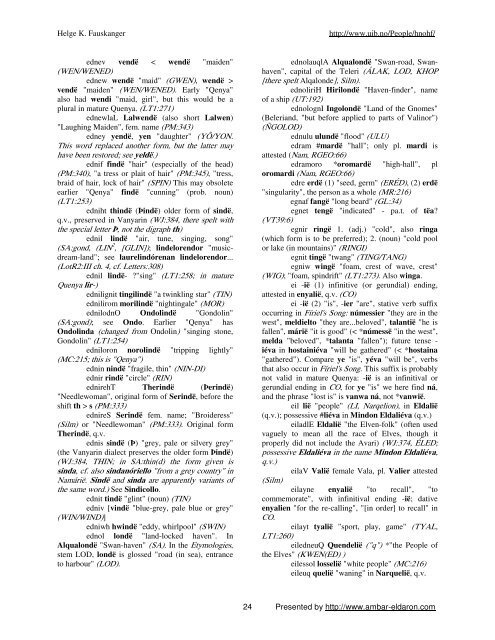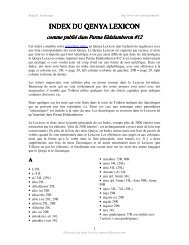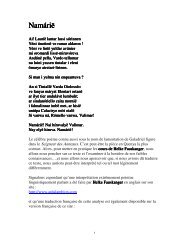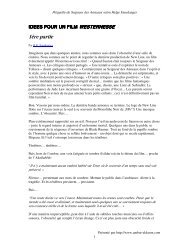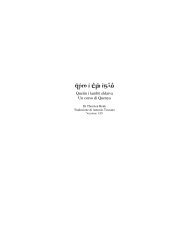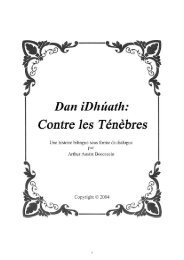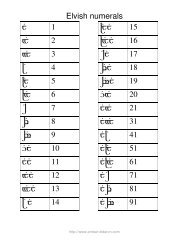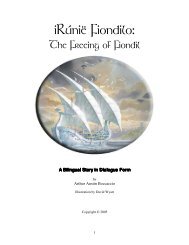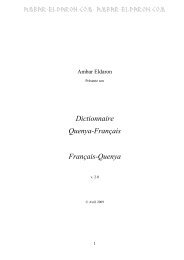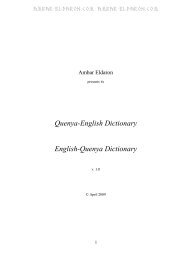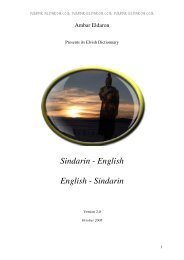Quenya Reverse Wordlist - Ambar Eldaron
Quenya Reverse Wordlist - Ambar Eldaron
Quenya Reverse Wordlist - Ambar Eldaron
You also want an ePaper? Increase the reach of your titles
YUMPU automatically turns print PDFs into web optimized ePapers that Google loves.
Helge K. Fauskanger http://www.uib.no/People/hnohf/<br />
ednev vendë < wendë "maiden"<br />
(WEN/WENED)<br />
ednew wendë "maid" (GWEN), wendë ><br />
vendë "maiden" (WEN/WENED). Early "Qenya"<br />
also had wendi "maid, girl", but this would be a<br />
plural in mature <strong>Quenya</strong>. (LT1:271)<br />
ednewlaL Lalwendë (also short Lalwen)<br />
"Laughing Maiden", fem. name (PM:343)<br />
edney yendë, yen "daughter" (YÔ/YON.<br />
This word replaced another form, but the latter may<br />
have been restored; see yeldë.)<br />
ednif findë "hair" (especially of the head)<br />
(PM:340), "a tress or plait of hair" (PM:345), "tress,<br />
braid of hair, lock of hair" (SPIN) This may obsolete<br />
earlier "Qenya" findë "cunning" (prob. noun)<br />
(LT1:253)<br />
edniht thindë (Þindë) older form of sindë,<br />
q.v., preserved in Vanyarin (WJ:384, there spelt with<br />
the special letter Þ, not the digraph th)<br />
ednil lindë "air, tune, singing, song"<br />
(SA:gond, (LIN 2 , [GLIN]); lindelorendor "musicdream-land";<br />
see laurelindórenan lindelorendor...<br />
(LotR2:III ch. 4, cf. Letters:308)<br />
ednil lindë- ?"sing" (LT1:258; in mature<br />
<strong>Quenya</strong> lir-)<br />
ednilignit tingilindë "a twinkling star" (TIN)<br />
ednilirom morilindë "nightingale" (MOR)<br />
ednilodnO Ondolindë "Gondolin"<br />
(SA:gond); see Ondo. Earlier "Qenya" has<br />
Ondolinda (changed from Ondolin) "singing stone,<br />
Gondolin" (LT1:254)<br />
edniloron norolindë "tripping lightly"<br />
(MC:215; this is "Qenya")<br />
ednin nindë "fragile, thin" (NIN-DI)<br />
ednir rindë "circle" (RIN)<br />
ednirehT Therindë (Þerindë)<br />
"Needlewoman", original form of Serindë, before the<br />
shift th > s (PM:333)<br />
ednireS Serindë fem. name; "Broideress"<br />
(Silm) or "Needlewoman" (PM:333). Original form<br />
Therindë, q.v.<br />
ednis sindë (Þ) "grey, pale or silvery grey"<br />
(the Vanyarin dialect preserves the older form Þindë)<br />
(WJ:384, THIN; in SA:thin(d) the form given is<br />
sinda, cf. also sindanóriello "from a grey country" in<br />
Namárië. Sindë and sinda are apparently variants of<br />
the same word.) See Sindicollo.<br />
ednit tindë "glint" (noun) (TIN)<br />
edniv [vindë "blue-grey, pale blue or grey"<br />
(WIN/WIND)]<br />
edniwh hwindë "eddy, whirlpool" (SWIN)<br />
ednol londë "land-locked haven". In<br />
Alqualondë "Swan-haven" (SA). In the Etymologies,<br />
stem LOD, londë is glossed "road (in sea), entrance<br />
to harbour" (LOD).<br />
24<br />
ednolauqlA Alqualondë "Swan-road, Swanhaven",<br />
capital of the Teleri (ÁLAK, LOD, KHOP<br />
[there spelt Alqalonde], Silm).<br />
ednoliriH Hirilondë "Haven-finder", name<br />
of a ship (UT:192)<br />
ednolognI Ingolondë "Land of the Gnomes"<br />
(Beleriand, "but before applied to parts of Valinor")<br />
(ÑGOLOD)<br />
ednulu ulundë "flood" (ULU)<br />
edram #mardë "hall"; only pl. mardi is<br />
attested (Nam, RGEO:66)<br />
edramoro *oromardë "high-hall", pl<br />
oromardi (Nam, RGEO:66)<br />
edre erdë (1) "seed, germ" (ERÉD), (2) erdë<br />
"singularity", the person as a whole (MR:216)<br />
egnaf fangë "long beard" (GL:34)<br />
egnet tengë "indicated" - pa.t. of tëa?<br />
(VT39:6)<br />
egnir ringë 1. (adj.) "cold", also ringa<br />
(which form is to be preferred); 2. (noun) "cold pool<br />
or lake (in mountains)" (RINGI)<br />
egnit tingë "twang" (TING/TANG)<br />
egniw wingë "foam, crest of wave, crest"<br />
(WIG); "foam, spindrift" (LT1:273). Also winga.<br />
ei -ië (1) infinitive (or gerundial) ending,<br />
attested in enyalië, q.v. (CO)<br />
ei -ië (2) "is", -ier "are", stative verb suffix<br />
occurring in Fíriel's Song: númessier "they are in the<br />
west", meldielto "they are...beloved", talantië "he is<br />
fallen", márië "it is good" (< *númessë "in the west",<br />
melda "beloved", *talanta "fallen"); future tense -<br />
iéva in hostainiéva "will be gathered" (< *hostaina<br />
"gathered"). Compare ye "is", yéva "will be", verbs<br />
that also occur in Fíriel's Song. This suffix is probably<br />
not valid in mature <strong>Quenya</strong>: -ië is an infinitival or<br />
gerundial ending in CO, for ye "is" we here find ná,<br />
and the phrase "lost is" is vanwa ná, not *vanwië.<br />
eil lië "people" (LI, Narqelion), in Eldalië<br />
(q.v.); possessive #liéva in Mindon Eldaliéva (q.v.)<br />
eiladlE Eldalië "the Elven-folk" (often used<br />
vaguely to mean all the race of Elves, though it<br />
properly did not include the Avari) (WJ:374, ÉLED;<br />
possessive Eldaliéva in the name Mindon Eldaliéva,<br />
q.v.)<br />
eilaV Valië female Vala, pl. Valier attested<br />
(Silm)<br />
eilayne enyalië "to recall", "to<br />
commemorate", with infinitival ending -ië; dative<br />
enyalien "for the re-calling", "[in order] to recall" in<br />
CO.<br />
eilayt tyalië "sport, play, game" (TYAL,<br />
LT1:260)<br />
eiledneuQ Quendelië ("q") *"the People of<br />
the Elves" (KWEN(ED) )<br />
eilessol losselië "white people" (MC:216)<br />
eileuq quelië "waning" in Narquelië, q.v.<br />
Presented by http://www.ambar-eldaron.com


